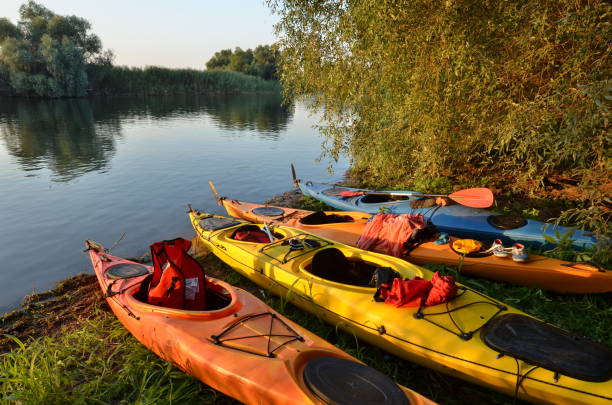If you’re a kayak owner or planning to purchase one, you might wonder, do kayaks need to be registered ? While the answer varies by state, it primarily depends on whether your kayak is motorized or non-motorized. Each state has its own regulations, and failing to comply with these could result in fines or restricted access to certain waterways.
This guide will help you understand the basics of kayak registration laws, how they apply in different states, and when registration becomes necessary.
General Kayak Registration Rules
In most U.S. states, non-motorized kayaks (traditional, paddle-powered kayaks) do not require registration. However, if you have added a motor to your kayak—whether it’s gas-powered or electric—registration is usually mandatory, similar to other motorized watercraft.
According to the U.S. Coast Guard (USCG), any vessel that is powered by a motor, including small craft like kayaks, is subject to registration requirements in most jurisdictions. The USCG also outlines that compliance with state laws ensures that boaters are following safety and identification rules, which help authorities manage waterways more effectively.
State-Specific Kayak Registration Requirements
States That Require Non-Motorized Kayak Registration
Some states have specific rules that require the registration of non-motorized kayaks. These are exceptions rather than the norm, but it’s important to be aware of them:
-
Ohio: Ohio is one of the few states that requires all kayaks to be registered, even non-motorized ones. According to the Ohio Department of Natural Resources (ODNR), kayaks of any size must have a valid registration decal to be used on public waterways. This applies regardless of whether the kayak is powered or manually paddled.
-
Minnesota: In Minnesota, non-motorized kayaks over 10 feet in length must be registered. The Minnesota Department of Natural Resources mandates that if your kayak exceeds this length, you must register it before using it in any public waters.
-
Pennsylvania: In Pennsylvania, non-motorized kayaks need to be registered only if they are being used in state parks or state-managed waterways. The Pennsylvania Fish and Boat Commission (PFBC) explains that registration ensures kayakers contribute to the maintenance of these areas, even if their vessels do not have motors.
-
Iowa: In Iowa, if your kayak is longer than 13 feet, it needs to be registered with the state. The Iowa Department of Natural Resources (DNR) specifies that registration helps manage boating activity and ensures compliance with state water safety regulations.
States Without Non-Motorized Kayak Registration
The majority of states, including popular outdoor destinations, do not require registration for non-motorized kayaks. Examples include:
-
California: According to the California Department of Parks and Recreation, non-motorized vessels like kayaks are exempt from registration, unless you add a motor.
-
Florida: The Florida Fish and Wildlife Conservation Commission confirms that non-motorized kayaks do not require registration. However, they emphasize that adding any type of propulsion system will trigger the need for registration.
-
New York: In New York, registration is only required for motorized watercraft, according to the New York State Department of Environmental Conservation. Non-motorized kayaks, canoes, and rowboats are exempt.
-
Texas: Texas law, as stated by the Texas Parks and Wildlife Department, requires registration only for motorized vessels. If your kayak is non-motorized, no registration is needed.
Motorized Kayaks: Registration is Almost Always Required
If you’ve added a motor to your kayak, even a small electric trolling motor, most states will require you to register it as a motorized watercraft. The process for registering a motorized kayak is generally the same as registering a motorboat, involving the submission of an application, proof of ownership, and payment of fees.
For example:
- In California, a motorized kayak must be registered with the California Department of Motor Vehicles (DMV), even if the motor is removable.
- In Florida, the Florida Highway Safety and Motor Vehicles (FLHSMV) requires that all motorized kayaks be registered, regardless of the type or size of the motor.
Typically, the registration fees are based on the length of the kayak and the type of motor. Additionally, registration numbers and decals must be affixed to the kayak in a clearly visible area.
Kayak Registration Fees
The fees for kayak registration vary depending on the state and whether the kayak is motorized or non-motorized. Below are some general estimates based on different states:
- Ohio: $20-$25 for non-motorized kayaks.
- Minnesota: $15-$25 for non-motorized kayaks over 10 feet.
- California: For motorized kayaks, registration fees range from $20-$40, depending on length and motor type.
- Florida: Motorized kayak registration fees start at $30, depending on the vessel’s specifications.
Fees typically need to be renewed annually or biannually, depending on the state. Many states also offer online registration renewal systems through their Department of Motor Vehicles (DMV) or equivalent.
Exemptions and Special Cases
Some states provide exemptions for specific cases where kayaks do not need to be registered. These can include:
- Rental Kayaks: Kayaks rented out for short-term recreational use are often exempt from registration, as the rental companies are responsible for managing licenses.
- Private Waters: If your kayak is only used on privately owned lakes or ponds, registration may not be required. For example, states like Michigan and Alaska allow kayaks on private waters without registration.
-
Event Exemptions: Certain events, such as kayaking races or organized group paddling trips, may offer temporary exemptions from registration requirements.
Why You Should Register Your Kayak
Even if your state doesn’t require kayak registration, there are still reasons why registering your kayak could be beneficial:
- Proof of Ownership: Registration provides documentation of ownership in case your kayak is lost or stolen.
- Access to Specific Waterways: In some states, like Pennsylvania, registration grants access to state parks and managed waterways, which may be restricted otherwise.
-
Safety and Compliance: Registering your kayak ensures you are up-to-date with the latest safety regulations and may make it easier to comply with state-specific boating rules.
Conclusion
In general, non-motorized kayaks do not require registration in most states, but there are notable exceptions, such as Ohio and Minnesota. On the other hand, if you have a motorized kayak, you will likely need to register it, regardless of the state.
Checking with your local Department of Natural Resources or DMV ensures you’re compliant with state laws, helping you enjoy your time on the water safely and legally.
For the latest information, it’s always a good idea to consult the official website of your state’s boating authority or Department of Motor Vehicles.


